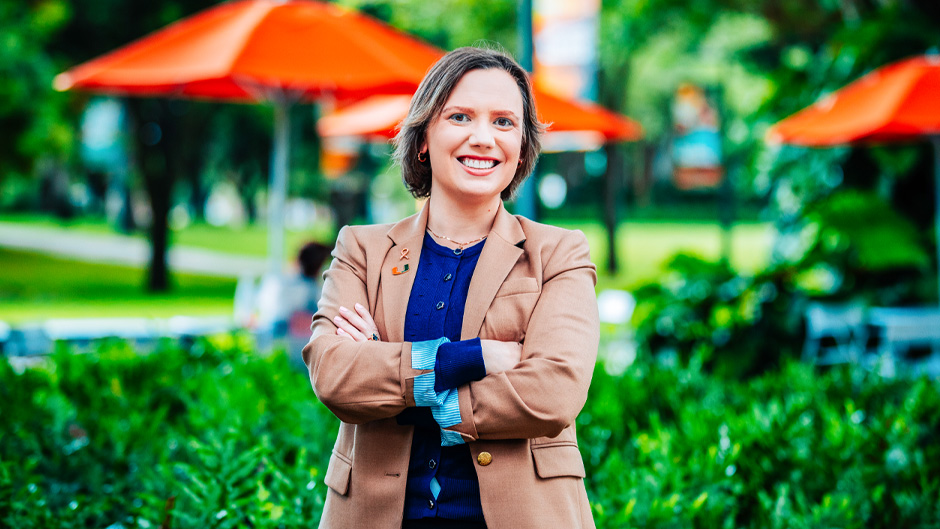Undergraduate students at the University of Miami can now get more academic support and guidance as part of the new Center for Academic Navigation and Success.
The University’s Office of the Provost spent the past seven months building the center and hiring more of what are now called Cane Navigators. In the past, individual academic advisors could shoulder up to 400 students—now each navigator will have no more than 250 students at a time. They will work with the University’s nearly 13,000 undergraduate students to improve access to academic advising.
“We want our students to have the best possible experience at the University, to foster their own professional and personal growth,” said Guillermo “Willy” Prado, interim executive vice president for academic affairs and provost. “By reducing caseloads, Cane Navigators can spend more time with students, and students should be able to meet with their navigator whenever necessary. This new center will help ensure that students flourish at the U academically, then graduate and thrive.”
While all navigators still specialize and are closely connected within the University’s schools and colleges that serve undergraduates, they will receive training through the center so each is aware of the resources available to students across the University. This was part of the vision of the center, said Valerie Robideaux, senior associate dean for student success.
“We hope to make the advising process more consistent for students, where there’s less ambiguity on who to talk to for every issue that comes up,” added Robideaux, who joined the University in July to lead the center.
The Center for Academic Navigation and Success will also oversee other areas that support students during their time at the University. This includes 10 transitional guides, who help first-year and transfer students through orientation and their first round of class registration. The center will also oversee Success Advocates, specially trained advisors that support students who are struggling academically.
In addition, the center will foster relationships between students and faculty mentors early in their undergraduate experience, Robideaux said.
“One of the biggest predictors of student success is establishing a connection with a faculty mentor,” she added.
Robideaux comes to the University with 16 years of experience in higher education at public and private institutions. She most recently served as interim executive director of student advising at the University of Alaska Anchorage. Before that, Robideaux worked at Centenary College of Louisiana. She will be working closely with Michael Stokes, who leads the expanded team of Cane Navigators; Anna Grinfeder, who oversees the Transitional Guides; Darby Plummer, who leads the Success Advocates; and Marina Marchena, who leads the center’s employee training and development.
While looking forward to using evidence-based strategies to further improve the undergraduate experience at the University, Robideaux is also working to keep center employees engaged and enthusiastic about helping Hurricanes achieve their own academic goals.
“Nothing beats the one-on-one connection, so we want to preserve that relationship and make it more accessible for students to receive academic guidance at the University,” Robideaux added.
In early August, the center held a kickoff event where approximately 80 staff members connected with University leaders, gleaned insights on national student success trends, and learned more about critical University resources to support students’ academic success, personal well-being, and sense of belonging. Henley Marcelus was just settling into his new role as a director of Cane Navigation at the College of Arts and Sciences. Marcelus has served as a student advisor for 16 years, mostly at Barry University, but is a lifelong ’Canes fan and is thrilled to join the University and the center.
“At a prestigious school like UM, a lower number of students per advisor is critical because then you can give each student even greater service, so the lower the ratio, the better,” said Marcelus, who will guide a team of navigators and manage his own caseload of students.
Shirley Rodriguez, an experienced University advisor who will help lead the Transitional Guides, is also glad to be a part of the new center.
“I think the center will really help match students with the appropriate channels on campus so they can get the best onboarding experience possible,” she said.
Prado and his team made academic advising a priority after hearing about a need for improvement from students, faculty members, and parents throughout the past year. He is now looking forward to using data to measure the center’s success.
“We will be using data-driven strategies to identify students who may need more support early on, and to see if student satisfaction with the advising process increases over time,” Prado said. “The goal here is to make sure every student gets a tailored experience with their navigator, who will be able to connect them to other services across the University as needed.”

